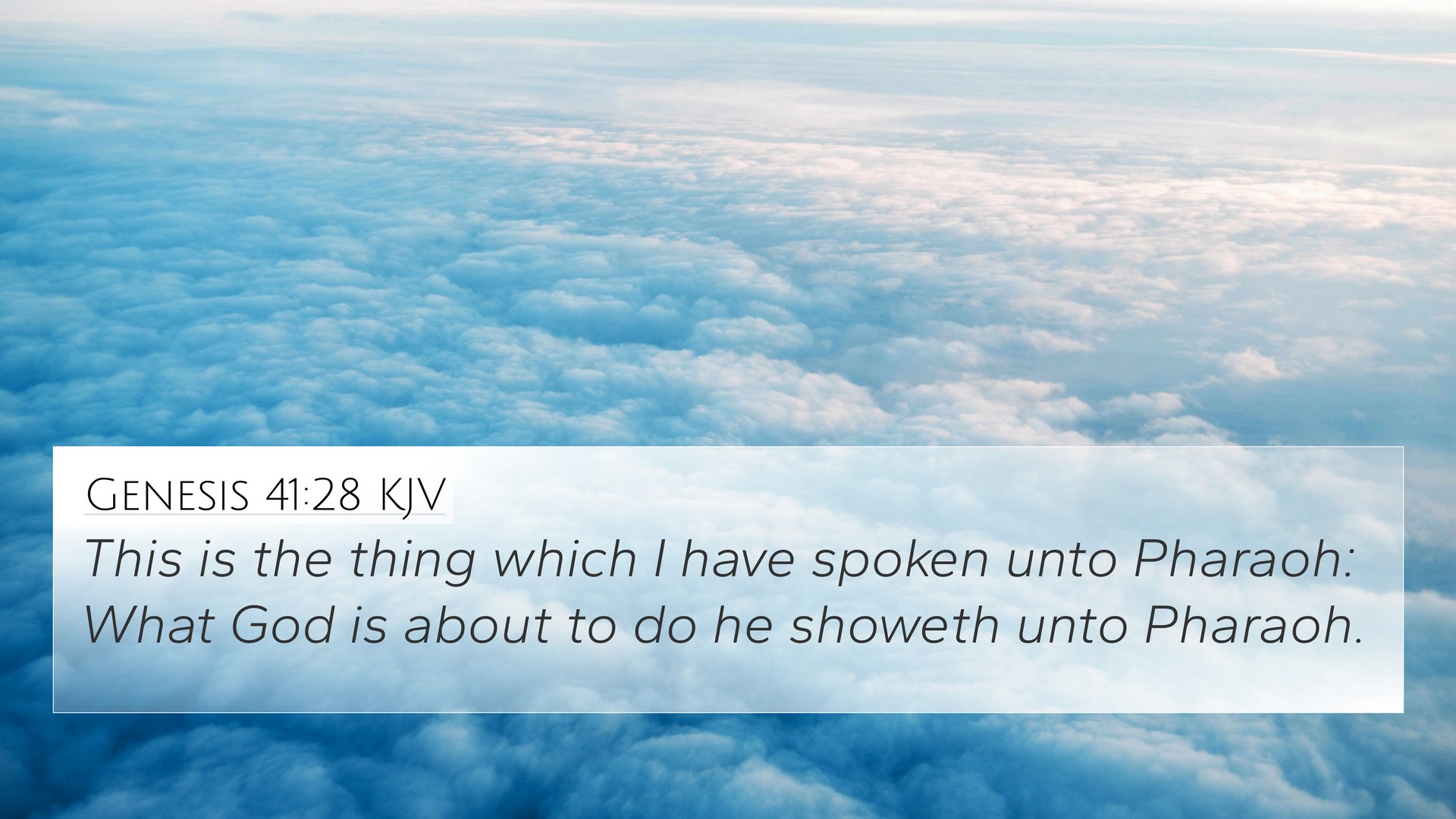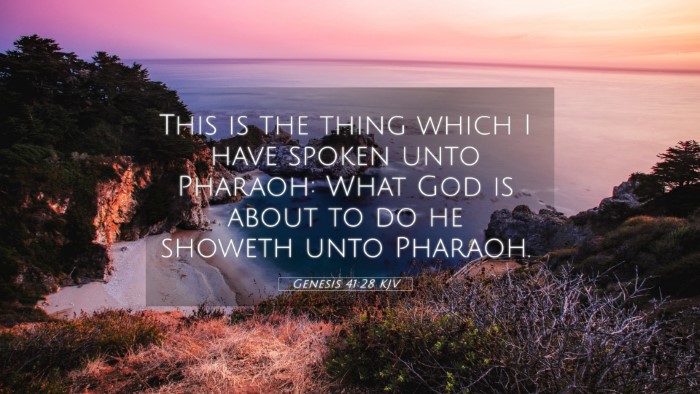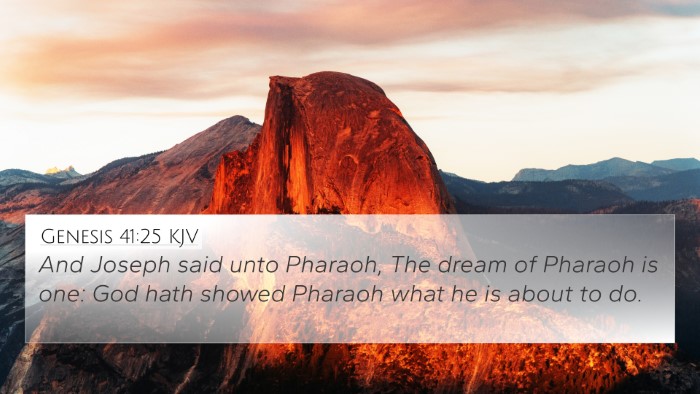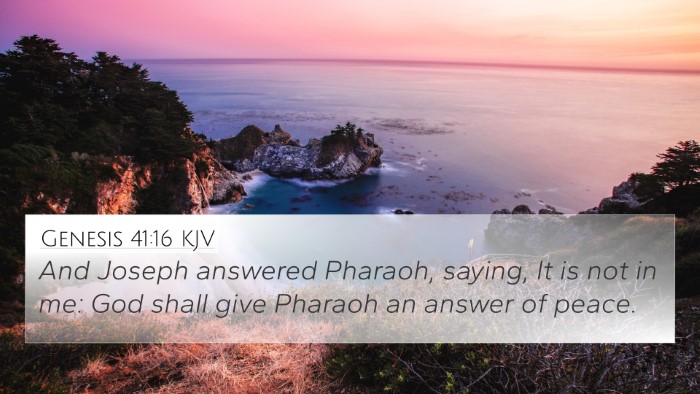Understanding Genesis 41:28
Genesis 41:28 states: "This is the thing which I have spoken unto Pharaoh: What God is about to do he showeth unto Pharaoh." This verse is pivotal as it emphasizes God's sovereignty and the revelation of His plans through dreams, a theme that resonates throughout the Scriptures.
Meaning and Interpretation
Throughout the public domain commentaries, insights highlight several key themes regarding this verse:
- Divine Revelation: The verse shows how God communicates His intentions to mankind, exemplifying His active role in history. Matthew Henry notes that God often uses dreams as a means of prophetic revelation.
- Preparation for Future Events: Clarke points out that Joseph’s interpretation of Pharaoh’s dreams serves as a divine warning, preparing Egypt for famine, illustrating God's foresight.
- Authority of God's Word: Albert Barnes emphasizes that Joseph's confidence in conveying God’s message underlines the authority of divine revelation against human wisdom.
- God’s Sovereignty: All commentators agree that the ability to know future events belongs solely to God, asserting His omniscience and control over worldly affairs.
- Trust in God's Plan: This verse invites believers to trust that God is in control and aware of what is to come, encouraging a posture of faith as events unfold.
- Unity Between Dreams and Reality: The narrative connects dreams with actual events, stimulating a broader understanding of how God can influence reality through dreams.
- The Role of the Faithful: Joseph's role reflects the responsibility of the faithful in interpreting and acting upon God’s revelations to guide others.
Cross-References
Genesis 41:28 has several Bible verse cross-references that can help understand its implications and connections:
- Genesis 41:1-7: The account of Pharaoh's troubling dreams introduces the setup for Joseph's interpretation.
- Daniel 2:28: Similar to Joseph, Daniel interprets dreams as revelations from God, affirming God’s sovereignty over kings and kingdoms.
- Acts 2:17-18: This New Testament passage cites prophecy from Joel, emphasizing the continuance of divine revelation through dreams and visions in the last days.
- Proverbs 19:21: Illustrates that while men make plans, it is ultimately God's purpose that prevails, a principle reaffirmed by the context of Genesis 41:28.
- Isaiah 46:10: States God declares the end from the beginning, reinforcing His ultimate control over history.
- Revelation 1:1: God communicates future events to His servants, paralleling how God communicated with Joseph.
- Genesis 40:8: Joseph attributes the interpretation of dreams to God, setting a precedent for recognizing divine agency.
Thematic Connections
This verse offers a rich context for thematic Bible verse connections:
- The Trustworthiness of God's Word: Readers can see how themes of trust and divine communication recur throughout scriptures as noted by Matthew Henry.
- God's Warning to Nations: The theme of warning nations of coming calamities is crucial from Genesis through Revelation, linking to prophetic books.
- Messengers of God: Joseph serves as a conduit for God’s message, relating to other Biblical figures like Noah and Jonah who also communicated divine warnings.
Conclusion
Genesis 41:28 is not only about Joseph's role in revealing God's plans but also encourages believers to carefully interpret God’s signs and trust in His ultimate sovereignty. Through cross-referencing, one can see connections in themes of prophecy, divine authority, and the communication of God's will that span both the Old and New Testaments.
The insights drawn from commentaries enhance our understanding of how revelation operates in biblical narratives, guiding us to appreciate the intricate ways in which God interacts with humanity through scripture.
Exploring Tools for Bible Cross-Referencing
For those looking to explore connections further, various tools for Bible cross-referencing can deepen understanding:
- Bible concordance
- Bible cross-reference guide
- Cross-reference Bible study materials
- Identifying connections between Old and New Testament texts
- Comparative study of Pauline epistles




